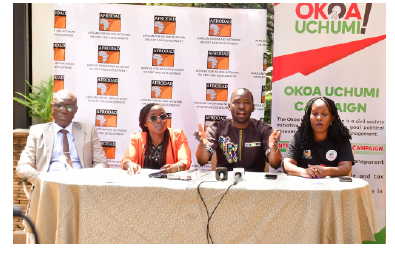Date
31 May 2024

AFRODAD AND PARTNERS ASK FOR THE REFORM OF THE SPECIAL DRAWING RIGHTS ALLOCATION SYSTEM AND OF THE GLOBAL FINANCIAL ARCHITECTURE
FOR IMMEDIATE RELEASE
[Nairobi, Kenya. 31 May 2024]. Africa Development Bank (AfDB) Group is currently holding its Annual Meeting in Nairobi, Kenya. The theme of the Group’s 59th Annual Assembly meeting is “Africa’s Transformation: the African Development Bank, and the Reform of the Global Financial Architecture".
The theme is set against the realisation that, despite sustained economic growth over the past two decades, Africa’s economic transformation remains a work in progress with a lot more to be done.
The Bank carries both implicit and explicit responsibilities to provide the necessary development financing for sustainable economic development and social progress for African countries. We therefore ask that the Bank should position itself as an indispensable player when it comes to the need to influence changes in the global financial architecture, including the SDRs allocation and rechanneling process.
As of 2024, nine African states are in debt distress, a further 15 are at high risk, and 14 are at moderate risk. Out of $10 collected in Africa, between $6-$8 goes to debt repayment and debt servicing, making it impossible to service basic needs including education, health, and social sectors.
While these are happening, the lopsided global financial architecture remains unresponsive to Africa’s needs, which was glaringly evident during the IMF’s issuance of its Special Drawing Rights (SDRs) in 2021 that saw Africa receive only $33 billion, a meager 5 percent of the total $650 billion issued, while richer countries, including the G7, received more than $200 billion, despite not having the greatest need for the resources.
The IMF quota allocation system that predetermines SDR allocations affirms the predisposition of an unfair global system that favors developed countries over developing countries in finance and decision-making.
In addition, while African countries benefited from their SDR allocations to boost their liquidity reserves, many more spent it on repaying debt. At least 35 countries spent $14 billion to pay down debt to the IMF when it could have been used to buffer them from the difficult economic period during COVID-19. A reform of the global financial architecture, therefore, becomes necessary to unlock the potential of SDRs towards economic transformation for countries that are most in need and most vulnerable to climate shocks.
It is against this background that the African perspective should be included in the call for reform on the Special Drawing Rights Allocation System to ensure that it is fit for purpose. As such, we, AFRODAD, Okoa Uchumi Coalition, and our partners including AERC, MEJN-Malawi, ANEEJ-Nigeria, UDN-Uganda, CTPD-Zambia, TISA-Kenya, CROSET-Chad, and LAREM-Senegal, present the following demands:
**Demands**
The African Development Bank has proposed a new tool called the Hybrid Capital Instrument (HCI). According to the AfDB, the HCI will enable the Bank to multiply the SDR contributions by three or four times and keep them at the IMF as part of its balance sheet. The Bank will then borrow money in hard currencies from capital markets and lend it to members in their preferred currency. With increased debt crisis in Africa, it, therefore, leaves a lot to be answered by AfDB in the criteria and system, whether it will act as a loan facility in distributing SDRs to its member states or rechanneling at a zero-interest rate. We believe that there’s a need to allocate the SDRs based on a country’s need basis and sectorial basis in order to provide a niche for development acceleration in Africa.
Africa Development Bank should continue championing for the reform on SDRs allocation system to reflect the need rather than economic might. This is because with the appropriate use of SDRs, it will help to solve liquidity problems at best, but emphasis also needs to be given to comprehensive debt management strategies to minimise the debt crisis in Africa. Reforming it to include factors like indebtedness and poverty would ensure a fairer allocation of SDRs based on countries' challenges. For instance, there is a need to expand the scope of the SDRs quota system beyond GDP. Available reports estimate that African countries utilised 85% of their allocated SDRs in 2021 compared to their developed counterparts. This demonstrates the need for a review of the SDRs quota system to take into consideration the development needs of each country or region regarding SDRs allocation.
International financial institutions and developed countries should commit to an open and transparent financial system that would promote inclusive growth. However, debt settlement in Africa, especially outside the Paris Club processes, has often experienced problems and delays, with costly economic consequences.
There is a need to adopt urgent reforms around SDRs allocation governance and reporting framework: SDRs allocations come as a general reserve that is tied to no specific development purposes. This makes it difficult to track and report its uses.
- Besides changing the quota formula, institutional reforms on how the IMF operates should be given greater attention to shift the loopsided Global Financial Architecture to work for all economies equally.
